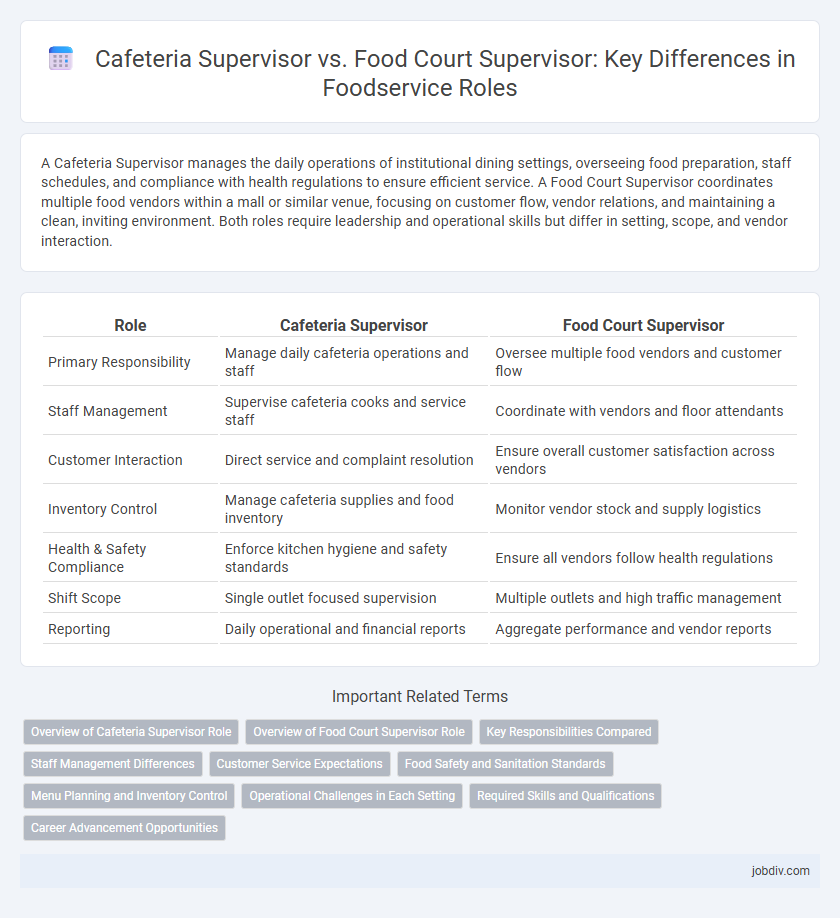A Cafeteria Supervisor manages the daily operations of institutional dining settings, overseeing food preparation, staff schedules, and compliance with health regulations to ensure efficient service. A Food Court Supervisor coordinates multiple food vendors within a mall or similar venue, focusing on customer flow, vendor relations, and maintaining a clean, inviting environment. Both roles require leadership and operational skills but differ in setting, scope, and vendor interaction.
Table of Comparison
| Role | Cafeteria Supervisor | Food Court Supervisor |
|---|---|---|
| Primary Responsibility | Manage daily cafeteria operations and staff | Oversee multiple food vendors and customer flow |
| Staff Management | Supervise cafeteria cooks and service staff | Coordinate with vendors and floor attendants |
| Customer Interaction | Direct service and complaint resolution | Ensure overall customer satisfaction across vendors |
| Inventory Control | Manage cafeteria supplies and food inventory | Monitor vendor stock and supply logistics |
| Health & Safety Compliance | Enforce kitchen hygiene and safety standards | Ensure all vendors follow health regulations |
| Shift Scope | Single outlet focused supervision | Multiple outlets and high traffic management |
| Reporting | Daily operational and financial reports | Aggregate performance and vendor reports |
Overview of Cafeteria Supervisor Role
A Cafeteria Supervisor manages daily operations, ensuring food safety compliance, staff coordination, and quality control in institutional settings such as schools or hospitals. Responsibilities include overseeing food preparation, inventory management, and customer service to maintain efficient and hygienic cafeteria environments. This role requires strong leadership, knowledge of dietary regulations, and the ability to handle both staff scheduling and conflict resolution.
Overview of Food Court Supervisor Role
Food Court Supervisors manage multiple food vendors within a shared dining space, ensuring operational efficiency, vendor compliance, and a cohesive customer experience. Responsibilities include coordinating vendor schedules, maintaining health and safety standards, and addressing customer service issues across diverse cuisines. This role demands strong leadership, multitasking skills, and the ability to handle high foot traffic environments effectively.
Key Responsibilities Compared
A Cafeteria Supervisor primarily manages food preparation, inventory control, and staff scheduling within a single cafeteria setting, ensuring compliance with health and safety standards. In contrast, a Food Court Supervisor oversees multiple vendor operations, coordinates between various food outlets, and manages customer flow to optimize service efficiency. Both roles require strong leadership and customer service skills, but the Food Court Supervisor emphasizes multi-unit coordination and vendor relations more intensely.
Staff Management Differences
Cafeteria Supervisors typically manage a smaller, consistent team focused on daily meal service within a single location, emphasizing routine scheduling, training, and direct oversight of kitchen and serving staff. Food Court Supervisors oversee multiple vendors and a larger, more diverse staff, requiring coordination across various food outlets and balancing different service standards and peak times. The key difference lies in the scale and complexity of staff management, with Cafeteria Supervisors concentrating on in-depth team development and Food Court Supervisors prioritizing cross-unit communication and operational efficiency.
Customer Service Expectations
Cafeteria Supervisors are expected to maintain consistent, efficient service with a focus on quick meal distribution and accommodating dietary needs within a controlled menu environment. Food Court Supervisors manage diverse vendor operations, emphasizing personalized customer interactions and seamless coordination among multiple food outlets to enhance the overall dining experience. Both roles require strong communication skills, but Food Court Supervisors must handle varied customer preferences and vendor-specific service standards more dynamically.
Food Safety and Sanitation Standards
A Cafeteria Supervisor enforces strict food safety protocols by ensuring proper temperature control, regular sanitation of food contact surfaces, and adherence to health department regulations to prevent contamination. Food Court Supervisors implement comprehensive sanitation standards across multiple food vendors, coordinating waste disposal, employee hygiene, and cross-contamination prevention in a high-traffic environment. Both roles prioritize rigorous training in food handling procedures and routine inspections to maintain compliance with food safety certifications and reduce risk of foodborne illnesses.
Menu Planning and Inventory Control
Cafeteria Supervisors emphasize standardized menu planning tailored to consistent meal cycles, ensuring balanced nutrition while optimizing ingredient usage to minimize waste. Food Court Supervisors handle diverse vendor offerings, coordinating menu variety to attract broad customer segments and managing inventory with flexibility to accommodate fluctuating demand across multiple food stalls. Both roles require meticulous inventory control, but cafeteria settings stress bulk purchasing accuracy, whereas food courts focus on real-time stock adjustments for diverse cuisines.
Operational Challenges in Each Setting
Cafeteria supervisors manage streamlined operations within a fixed menu environment, requiring efficient coordination of meal preparation, staff scheduling, and inventory control to meet high-volume demands during limited service hours. Food court supervisors face the complexity of overseeing multiple, diverse food vendors, necessitating coordination among tenants, adherence to varied health regulations, and managing fluctuating customer traffic throughout extended operating hours. Both roles demand robust problem-solving skills, yet cafeteria supervisors focus more on internal process optimization while food court supervisors prioritize vendor collaboration and customer experience management.
Required Skills and Qualifications
Cafeteria Supervisors require strong organizational skills, experience in food safety compliance, and the ability to manage a consistent meal service flow in institutional settings such as schools or hospitals. Food Court Supervisors need expertise in multi-vendor coordination, customer service management, and quick problem-solving to handle a high-traffic, diverse culinary environment. Both roles demand leadership abilities, staff training experience, and knowledge of health regulations to ensure quality and safety standards are maintained.
Career Advancement Opportunities
Cafeteria Supervisors often benefit from structured career advancement paths within institutional or corporate foodservice settings, enabling progression to roles like Foodservice Manager or Operations Director. Food Court Supervisors gain diverse experience managing multiple vendor operations, which can lead to opportunities in multi-unit management or retail hospitality leadership. Both roles develop essential skills in staff coordination, inventory control, and customer service, critical for advancing into broader foodservice management positions.
Cafeteria Supervisor vs Food Court Supervisor Infographic

 jobdiv.com
jobdiv.com